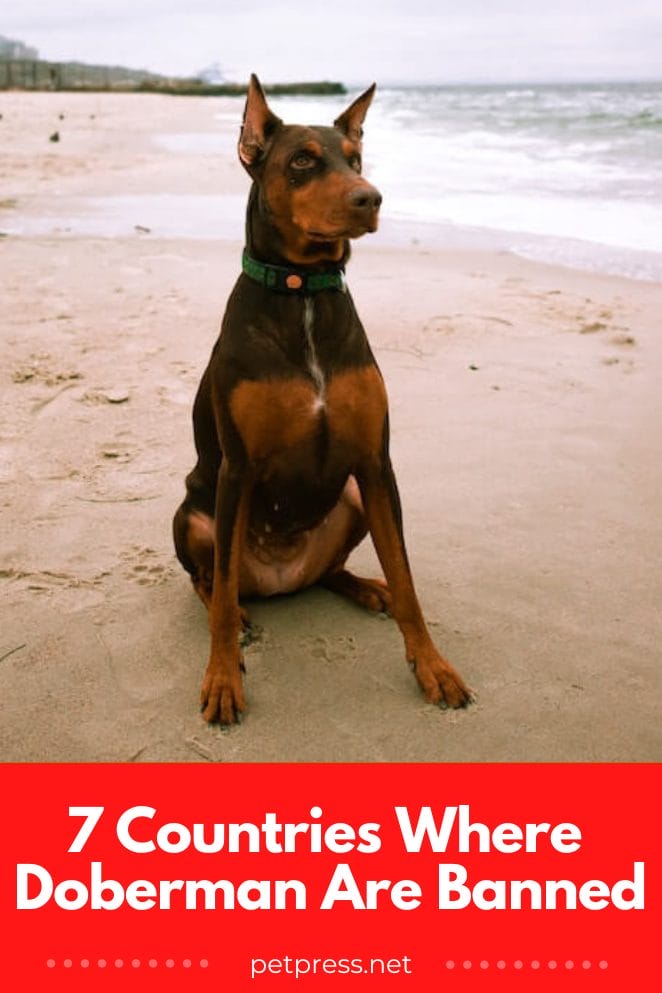
Doberman Pinschers, affectionately called Dobies or Dobs, are known for their loyalty and intelligence.
Highly sought-after as working dogs, they were originally bred to be guard dogs and police dogs.
But despite their many admirable qualities, the breed has been banned in a few countries due to its intimidating look and aggressive nature.
In this article, we’ll discuss why the Doberman breed is frowned upon in some places and the countries where Dobermans are restricted or banned. So buckle up and let’s dive into all things Dobie!
Why are Dobermans considered dangerous?
Contrary to popular belief, Dobermans are not an inherently aggressive or dangerous breed of dog! In fact, they are considered one of the most intelligent and loyal breeds.
But what makes them appear so intimidating? Let’s take a look at the physical features that add to their presence.
Dobermans have strong and muscular bodies making them very agile, powerful, and fast.
They have short fur that ranges in color from black to brown with a unique marking pattern on the face and chest.
Additionally, they have long legs and tall ears that always seem alert – giving off an intimidating vibe when standing upright.
They have a bite force of 305-330 PSI and can be quite territorial when it comes to protecting their owners.

As such, Dobermans are not recommended for novice dog owners as they require a lot of socialization and training in order to avoid aggressive behavior.
Ultimately, Doberman’s dangerous reputation can be attributed to bad breeding practices that have resulted in aggressive dogs with behavioral issues.
Because of these issues, some countries have banned or restricted the ownership of Dobermans.
But don’t let these physical characteristics fool you.
Dobermans are incredibly gentle companions if trained correctly – they can make excellent guard dogs, and therapy dogs, and even help to protect their families.
With proper training and socialization, Dobermans can learn how to react appropriately in different situations.

7 Countries where Doberman are restricted or banned
There are several countries around the world that limit or prohibit the ownership of Dobermans. Here’s a list of seven places where Dobies are not allowed:
1. Brazil:
Dobermans are banned in Brazil due to their aggressive behavior. The law states that no dog can be owned without permission from the local authorities and an extensive background check on the owner.
2. Singapore:
In Singapore, it is illegal to own a Doberman as they are considered a dangerous breed.
All dogs must have a microchip implanted in them for identification and tracking purposes, as well as undergo regular physical health exams and vaccinations.
3. Germany:
Although not strictly banned, the ownership of a Doberman is heavily regulated in Germany.
Pets must be tattooed or microchipped, undergo regular check-ups by veterinarians, receive specialized training, and wear muzzles when out in public areas.
Owners may also be required to pay additional fees or take out liability insurance.
4. China:
Dobermans are banned in China due to their aggressive nature and size.
All potential owners must first receive permission from the local government and then comply with strict regulations regarding training, registration, insurance, and microchipping of the animal.
5. Ukraine:
In Ukraine, the ownership of a Doberman is only allowed if certain licenses or permits are obtained from the local authorities.
The pets must also be registered with the police and all owners must take out liability insurance.

6. UAE:
Dobermans are banned in the UAE due to their potential danger towards other people and animals. Import of this breed is not allowed.
7. Malaysia:
Dobermans are considered a dangerous breed of dog in Malaysia and as such, their ownership is strictly regulated.
Strict licensing laws must be followed, with all pets required to have microchips implanted, receive regular check-ups from veterinarians, and wear muzzles when out in public areas.
Conclusion
Overall, there are restrictions on owning a Doberman pinscher in many countries around the world due to its reputation for aggression and violence.
Most places allow them if certain regulations are followed and licenses obtained beforehand.
This helps ensure that responsible owners can enjoy their pets without endangering the public or their animal’s safety.
For more information about each country’s specific laws regarding Dobermans, it is recommended to research them further or contact a local authority.


GIPHY App Key not set. Please check settings